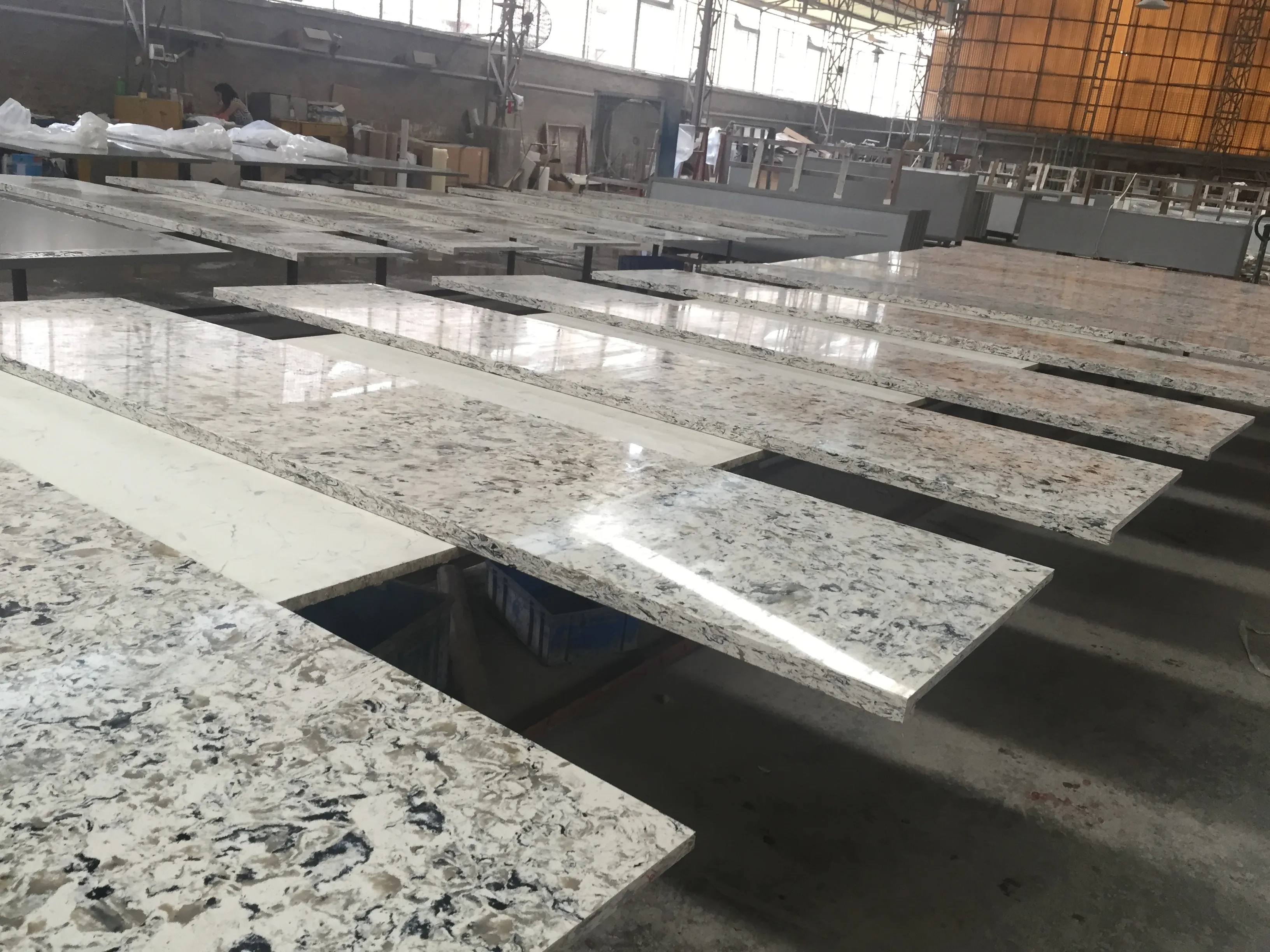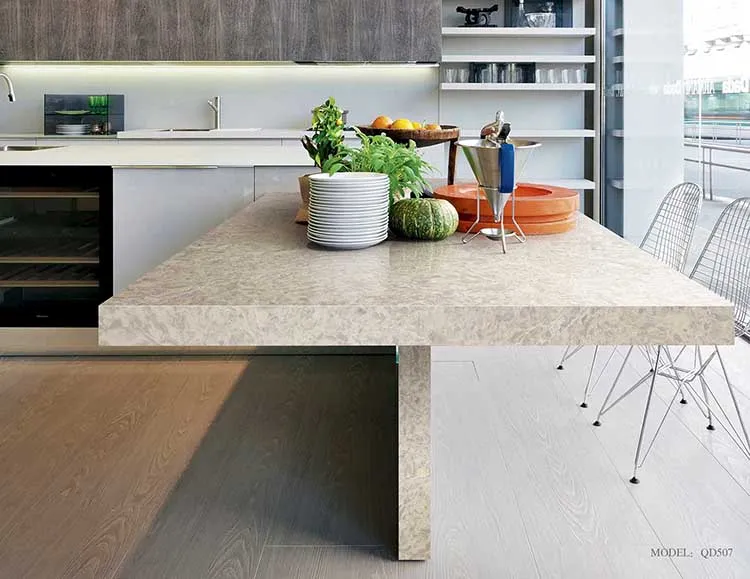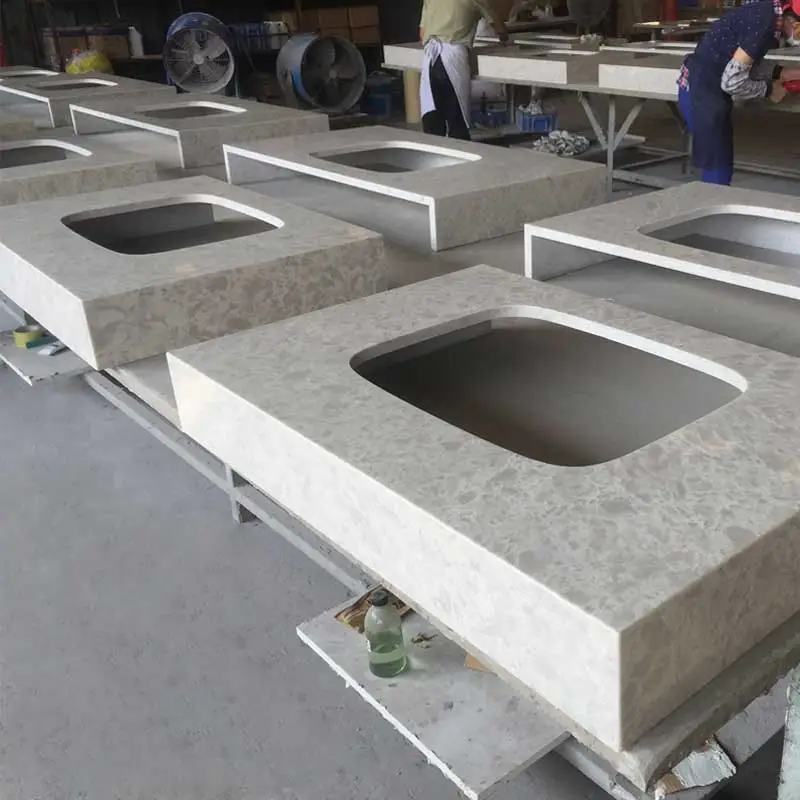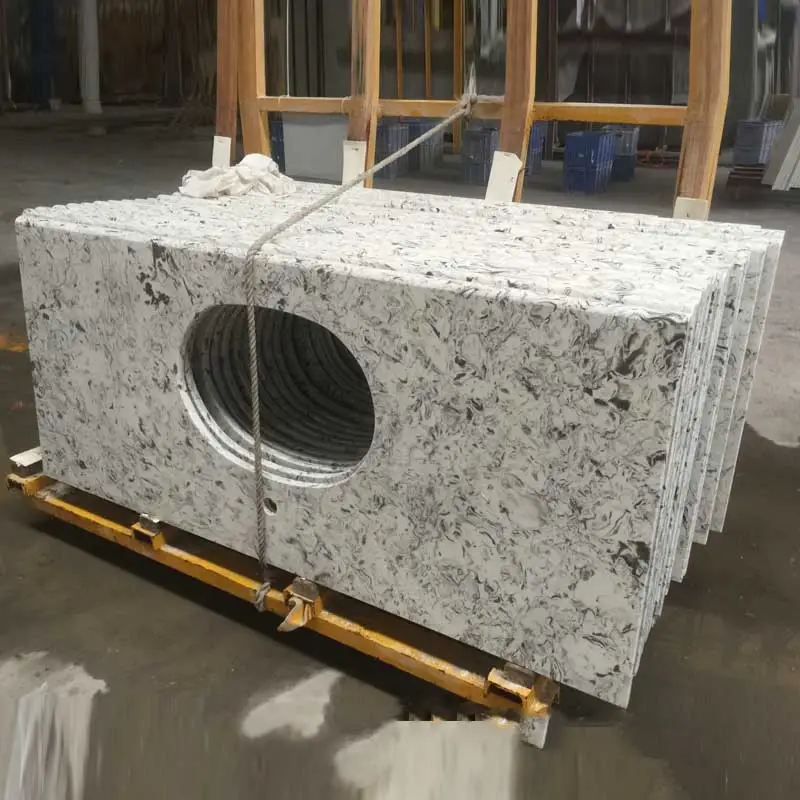Quartz countertops have become one of the most popular materials for kitchen and bathroom renovations in recent years because of their beauty, durability and ease of maintenance. Quartz countertops are usually available in two common thickness specifications: 2cm (about 0.78 inches) and 3cm (about 1.18 inches). When consumers choose quartz countertops, they often face a key question: Are 2cm quartz counter tops cheaper than 3cm quartz counter tops? The answer to this question is not simple, because the price difference depends on a variety of factors, including material cost, installation fees, market demand, etc.
This article will analyze these factors and explore the price difference between 2cm and 3cm quartz countertops in detail, and help consumers understand the cost impact of choosing countertops of different thicknesses.

Material Cost of 2cm vs. 3cm Quartz Countertops
The most direct determinant of the price of quartz counter tops is the material cost. Quartz countertops are made of a mixture of materials such as quartz crystals, resins, and pigments. Increased thickness means an increase in the amount of material used per unit area, so theoretically, a 3 cm thick quartz counter top has a higher material cost than a 2 cm one.
Difference in material usage
From a physical point of view, a 3 cm thick quartz counter top has 50% more material than a 2 cm thick quartz counter top. This means that, for the same area, a 3 cm quartz countertop uses more quartz crystals and resin. Therefore, the material cost of a 3 cm countertop is theoretically higher than that of a 2 cm countertop. Since quartz crystal is the main raw material for quartz countertops, manufacturers need to consume more raw materials to manufacture 3 cm products, which increases the material cost per unit area.
Quality and content of quartz crystals
Although material thickness has a greater impact on cost, the quality and content of quartz crystals in quartz countertops of different thicknesses may also vary. Some 2 cm thick quartz countertops may use high-quality quartz raw materials or use more sophisticated processes in the production process, making their prices close to or even higher than some ordinary 3 cm countertops. Therefore, thickness is not the only factor that determines the cost of the material. The purity, origin and manufacturing process of the quartz crystal will affect the final price.

Processing and transportation costs
In addition to the differences in the materials themselves, the processing and transportation costs of 2 cm and 3 cm quartz countertops will also affect the final price. During the manufacturing and installation process, these two thicknesses of quartz counter tops show different cost structures.
Processing costs
The processing of quartz countertops includes cutting, edging, polishing and other custom processing. Although 3 cm countertops require more complex processing due to the increased thickness, the actual processing cost difference may not be significant. Quartz is an extremely hard material. The equipment and technical requirements required for cutting and forming 2 cm and 3 cm countertops are similar. The only difference is the length of cutting time and the amount of consumables.
In addition, some complex designs, such as the edge treatment or inlay design of the countertop, may produce different processing difficulties on countertops of different thicknesses. Since 3 cm thick countertops require greater force and higher precision when processing, the processing process may be slightly more complicated, thus adding certain costs. However, the difference in these processing costs is relatively small and is not usually a major factor in determining the price difference between 2 cm and 3 cm quartz countertops.
Transportation costs
Transportation costs are one of the important factors affecting the price of quartz counter tops. Since 3 cm thick quartz countertops are much heavier than 2 cm thick countertops, the handling and loading and unloading costs required during transportation are also increased accordingly. 3 cm countertops weigh 50% more than 2 cm, which requires stronger packaging and support during long-distance transportation to prevent the countertops from breaking or being damaged. Because quartz materials are harder but also more brittle, thick 3 cm quartz countertops are more susceptible to damage during transportation and require additional protection.
Although transportation costs will increase with increasing thickness, this difference is usually not a decisive factor. The main costs of quartz counter tops are still concentrated in materials and installation, and transportation costs account for a relatively small proportion of the overall budget, unless it is a large-scale transportation across regions.

Comparison of installation costs
Installation is an important part of the overall price of quartz countertops. The thickness of the countertop directly affects the complexity, time, and labor required for installation, so there can be significant differences in the installation costs of 2 cm and 3 cm quartz counter tops.
Installation Complexity
Because 3 cm thick quartz countertops are heavier, they require more labor and equipment support when installed. In actual operation, installing 3 cm quartz countertops may require more efficient tools, more support structures, and additional personnel to carry and fix them. This not only increases the installation time, but also increases the installation cost accordingly.
Conversely, 2 cm thick quartz countertops are lighter and easier to carry and install. In some cases, the installation of 2 cm countertops may only require two or three people to complete, while the installation of 3 cm countertops may require additional personnel or specialized equipment such as cranes or countertop suction cup devices. Therefore, despite the lower material cost, 2 cm quartz countertops may be more cost-effective than 3 cm in some projects due to the lower installation costs.
Support Requirements
Thicker quartz countertops generally require more bottom support. When installing 2 cm thick quartz counter tops, installers usually recommend adding additional support materials, such as plywood or support beams, under the countertop to ensure that the countertop does not bend or crack during use. These additional support structures will increase the installation cost to a certain extent.
In contrast, 3 cm thick quartz counter tops usually do not require additional support due to their greater thickness and more solid structure. This makes it possible that in some installation scenarios, although the material cost of 3 cm countertops is higher, the installation cost is lower or equivalent to that of 2 cm countertops because no support structure is required.

The impact of market demand and supply chain
Market demand and supply chain conditions are also important factors in determining the price of quartz countertops. The price of quartz countertops in different regions and brands will fluctuate significantly due to changes in supply and demand. The market demand for 2 cm and 3 cm quartz counter tops is not exactly the same, so their prices are also affected by supply and demand.
Market demand
In some markets, 2 cm thick quartz counter tops are more common, especially in European and Asian markets, where thinner countertops are considered more suitable for modern minimalist style decoration needs. Therefore, manufacturers and suppliers may be more willing to produce and promote 2 cm thick countertops in these regions, making their prices relatively lower.
In the North American market, 3 cm thick quartz counter tops are more mainstream, especially in traditional and high-end decoration projects, consumers prefer thicker countertops. Due to the high market demand, the supply chain of 3 cm quartz counter tops is more mature and the price is more competitive. Therefore, in some cases, although the material and transportation costs of 3 cm quartz countertops are higher, the price difference is not as obvious as expected due to its high market demand.
Brand and supply chain
Quartz counter tops from different brands also differ in pricing. Some high-end brands may price 2 cm and 3 cm countertops higher, while some popular brands may price 2 cm and 3 cm countertops closer to each other to meet the needs of different markets. In addition, the supply chain status of quartz countertops will also affect prices. For example, in the case of tight supply of certain raw materials or rising transportation costs, price fluctuations may be more obvious.
Is 2 cm quartz countertop cheaper than 3 cm quartz countertop?
In general, 2 cm quartz countertops are generally cheaper than 3 cm quartz countertops, especially in terms of material costs and shipping costs. However, this conclusion is not absolute, and the actual price also depends on a variety of factors, including installation costs, support requirements, market demand and brand differences. In some cases, although the material cost of 2 cm countertops is lower, the installation cost may make it similar to or even higher than the price of 3 cm countertops due to the need for additional support structures.

